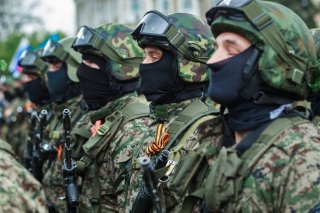The Wagner Group in Africa Is Where the Rubber Meets the Road
The Russian quasi-private military group has established a foothold from Ukraine to Africa
An increasing media galore is witnessing the discussion of the role of Wagner Group, a Russian quasi-private military company (PMC), in the Ukrainian conflict.
The Wagner Groups’smercenaries are popping up all over Ukraine, allegedly committing blatant war crimes and providing the necessary combat skill lacking among young, untrained Russian conscripts. While the focus is on Ukraine, the actual value of Wagner is in Africa. Russian paramilitary groups and mercenaries are increasing their footprint in Africa, from Mali to the Central African Republic. While the Russian army is bogged down in a war of attrition with Ukraine, the Wagner Group is a placeholder for Moscow’s geopolitical interests in natural resource-rich African countries. Several reasons are related to the increasing footprint of the Wagner Group in the continent, starting with Russia’s long history of involvement in Africa and the support of strong ties with several African countries. Since Putin’s rise to power, Russia has increased its economic and military presence in Africa.
The Wagner Group is an efficient tool to further Russian objectives on the continent without attracting the same level of scrutiny as regular Russian military units. Besides offering plausible deniability, Wagner is a source of income for oligarchs tied to Putin. For example, in Africa, Wagner’s training services and supply of Russian military hardware are a source of hard currency and precious metals that help the Kremlin to mitigate international sanctions.
To b clear, the Wagner Group more often refers to the Kremlin’s commitment to using paramilitary groups and mercenaries as the sharp end of the stick of its foreign policy from the Middle East to Africa. The Kremlin’s strategy is straightforward: mercenaries provide plausible deniability and achieve precise strategic objectives with limited resources. Russia’s proxy warfare doctrine has changed since Soviet times. Today, it cannot count on former Soviet satellite states to provide the proxy forces required to conduct expeditionary warfare, such as the Cubans in Angola. The use of mercenaries is related to efficiency and the fact that Moscow’s options are limited. Tor Bukkvall, a specialist on Russia’s military strategy, defines the Wagner Group as Moscow’s “power projection on the cheap.”
The Syrian conflict demonstrated how agile and well-trained combat units motivated by money can be a gamechanger. Small units fighting against untrained armed militia and guerrilla forces enabled Moscow to establish influence at a low cost and maintain public deniability in case of failure or blatant human rights violations. Having proved its value in support of the Assad regime and in Libya—where it orchestrated Khalifa Haftar’s successful defense of the oil crescent after he was routed in Tripoli—the Wagner Group expanded its franchise to Africa.
In the continent, however, the Wagner Group is not used only to further the Kremlin’s geopolitical aims but to line the pockets of the Russian elite by establishing a presence in resource-rich countries, where they ally with militias in return for payments in cash or mining concessions. In this regard, Russian PMCs are helping the country work around crippling sanctions.
Moscow’s paramilitary groups are increasing their footprint in Africa. In Sudan, the Wagner Group provided security and logistical support to save former president Omar al-Bashir in exchange for diamond mining concessions. The group supported the Central African Republic government’s struggle against rebel groups. While in Mozambique, the Wagner Group could not provide decisive support to government forces fighting insurgency in the northern part of the country.
Today, Russia relies on distinct armed groups to do its bidding: regular military, mercenaries, special forces operators in disguise, and paramilitaries. Depending on Moscow's needs, a single Russian operator could play each of these roles.
The host government requested the Wagner group’s presence in several African states, while Moscow denies any government involvement. As soon as the boots are on the ground, the Russian disinformation campaign is then ramped up a notch on social media and even with movies supporting Moscow’s presence in Russian and local languages. The propaganda message is straightforward: Russian quasi-PMCs are the last bastions against Islamic terrorists supported by Western mercenaries. Two recent movies distributed in Russia and Africa, Granite and Tourist, which were filmed in the Central African Republic and paid for by a Russian company owned by Wagners’ founder are a case in point.
The case of Mali, where the government officially asked the Wagner Group to support its struggle against terrorist groups, represents this trend. Even Foreign Minister Sergey Lavrov confirmed reports that Mali contracted the group to fight extremism in the Sahel, asserting that it is a business agreement between a state and a private company without Moscow’s involvement.
Is it not by chance that shortly after an increased Russian presence in Mali, the government of neighboring Burkina Faso was ousted in a January 2022 military coup—the fifth in a year in West and Central Africa, a region known as the continent’s “coup belt.”
Mali is just a tiny piece of a broader geopolitical puzzle Russia is acquiring in the Sahel and sub-Saharan Africa. The Syrian playbook, previously tested by the Kremlin during the support of the Assad regime, works like a charm in Africa: moving into a region of interest with a small number of boots on the ground and in a cost-efficient manner while all the attention is centered on Ukraine.
Therefore, the presence of Wagner and similar groups is an early warning indicator that Russia is going to try and alter the political and regional status quo in the short term, months and not years, with any indirect means ranging from deception, active propaganda, and violent actions including political decapitation and supporting military’s coup.
Dr. Alessandro Arduino is an associate at Lau China Institute, King’s College London. His most recent book is China’s Private Army: Protecting the New Silk Road (Palgrave, 2018).
Image: fotoandy/Shutterstock.com.

